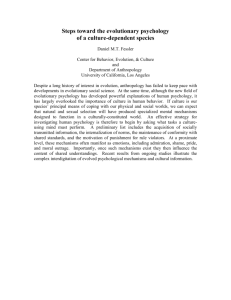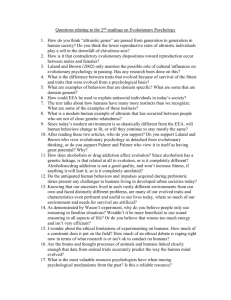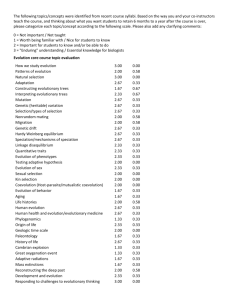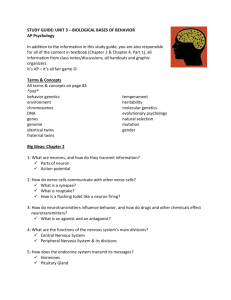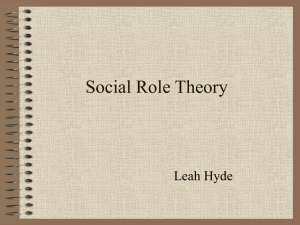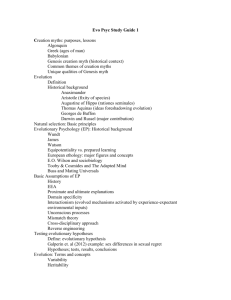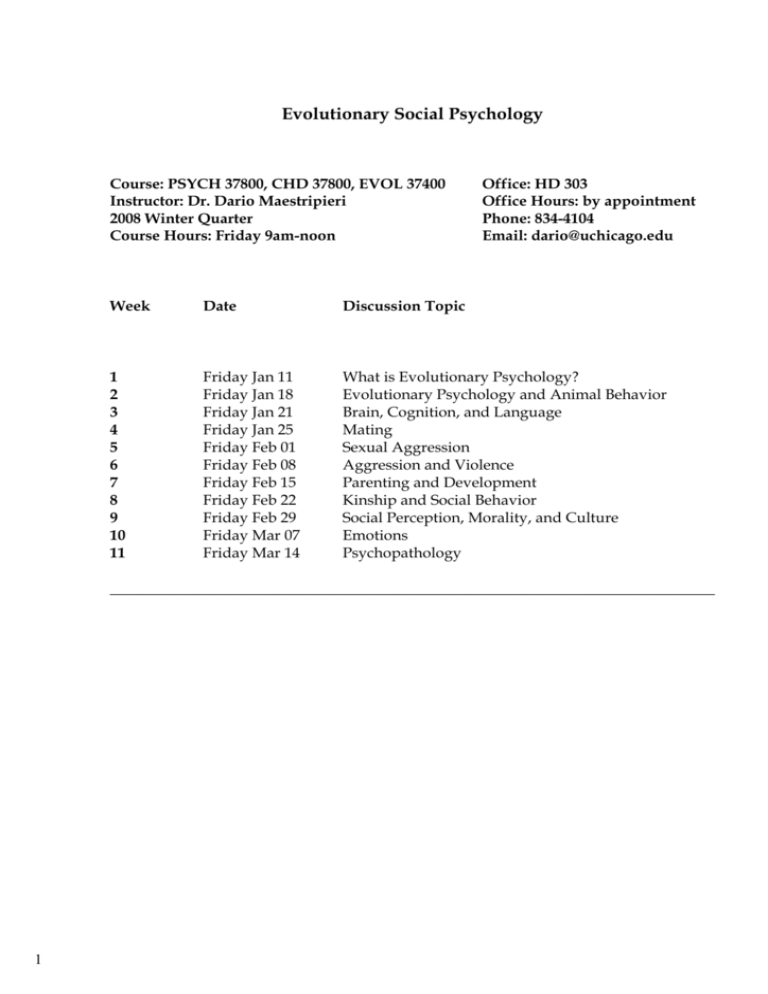
Evolutionary Social Psychology
Course: PSYCH 37800, CHD 37800, EVOL 37400
Instructor: Dr. Dario Maestripieri
2008 Winter Quarter
Course Hours: Friday 9am-noon
Office: HD 303
Office Hours: by appointment
Phone: 834-4104
Email: dario@uchicago.edu
Week
Date
Discussion Topic
1
2
3
4
5
6
7
8
9
10
11
Friday Jan 11
Friday Jan 18
Friday Jan 21
Friday Jan 25
Friday Feb 01
Friday Feb 08
Friday Feb 15
Friday Feb 22
Friday Feb 29
Friday Mar 07
Friday Mar 14
What is Evolutionary Psychology?
Evolutionary Psychology and Animal Behavior
Brain, Cognition, and Language
Mating
Sexual Aggression
Aggression and Violence
Parenting and Development
Kinship and Social Behavior
Social Perception, Morality, and Culture
Emotions
Psychopathology
______________________________________________________________________________
1
COURSE DESCRIPTION
This course explores human behavior and social relationships from the perspective of
evolutionary theory. In this course we will read and discuss articles in which
evolutionary theory has been applied to different aspects of human behavior and social
life such as: developmental sex differences, cooperation and altruism, competition and
aggression, physical attractiveness and mating strategies, incest avoidance and
marriage, sexual coercion, parenting and child abuse, emotions, language and
cognition, and psychological and personality disorders. Articles written by both
evolutionary psychologists and their critics will be discussed.
EXAMS and GRADING
There are no exams for this course. Evaluation is based upon attendance and
participation in the weekly discussions of reading materials.
TEXT
Small books, book chapters, and articles will be used.
2
READINGS
Week 1
Tooby, J. & Cosmides, L. (1992). The psychological foundations of culture. In: The
Adapted Mind (J. H. Barkow, L. Cosmides, & J. Tooby, eds.). New York: Oxford
University Press, pp. 19-136.
Crawford, C. (1998). The theory of evolution in the study of human behavior: An
introduction and overview. In: Handbook of Evolutionary Psychology (C.
Crawford & D. L. Krebs, eds.). Mahwah, NJ: Erlbaum, pp. 3-41.
Kenrick, D. T. & Simpson, J. A. (1997). Why social psychology and evolutionary
psychology need one another. In: Evolutionary Social Psychology (J. A. Simpson
& D. T. Kenrick, eds.). Mahwah, NJ: Erlbaum, pp. 1-20.
Buss, D. M. (1997). The emergence of evolutionary social psychology. In:
Evolutionary Social Psychology (J. A. Simpson & D. T. Kenrick, eds.). Mahwah,
NJ: Erlbaum, pp. 387-400.
Week 2
Tooby J, Cosmides L (1989). Adaptation versus phylogeny: the role of animal
psychology in the study of human behavior. The International Journal of
Comparative Psychology 2: 175-188.
Daly M, Wilson MI (1999). Human evolutionary psychology and animal
behavior. Animal Behaviour 57: 509-519.
Maestripieri D, Roney JR (2006). Evolutionary developmental psychology:
Contributions from comparative research with nonhuman primates.
Developmental Review, 26: 120-137.
Maestripieri D. (2007). Macachiavellian Intelligence: How Rhesus Macaques and
Humans Have Conquered the World. Chicago: University of Chicago Press.
Week 3
Tooby, J. & Cosmides, L. (1995). Mapping the functional organization of mind and
brain. In M. S. Gazzaniga (Ed.), The Cognitive Neurosciences. Cambridge, MA:
MIT Press, pp. 1185-1197.
Cosmides, L. & Tooby, J. (1995). From function to structure: The role of evolutionary
biology and computational theories in cognitive neuroscience. In M. S.
Gazzaniga (Ed.), The Cognitive Neurosciences. Cambridge, MA: MIT Press, pp.
1199-1210.
Pinker, S. & Bloom, P. (1990). Natural language and natural selection. Behavioral
and Brain Sciences, 13: 707-784.
Silverman, I. & Eals, M. (1992). Sex differences in spatial abilities: evolutionary
3
theory and data. In: The Adapted Mind (J. H. Barkow, L. Cosmides, & J. Tooby,
eds.). New York: Oxford University Press, pp. 533-549.
Geary, D. C. (1996). Sexual selection and sex differences in mathematical abilities.
Behavioral and Brain Sciences, 19: 229-284.
Week 4
Buss, D. M. (1989). Sex differences in human mate preferences: Evolutionary
hypotheses tested in 37 cultures. Behavioral and Brain Sciences, 12: 1-49.
Eagly, A. H. & Wood, W. (1999). The origin of sex differences in human behavior.
Evolved dispositions versus social roles. American Psychologist, 54: 408-423.
Gangestad, S. W. & Simpson, J. A. (2000). The evolution of human mating:
trade-offs and strategic pluralism. Behavioral and Brain Sciences, 23:
573564.
Gangestad SW, Thornhill R., Garver-Apgar CE (2005). Adaptations to
ovulation: Implications for sexual and social behavior. Current
Directions in Psychological Science. 14: 312-316.
Kirkpatrick, R. C. (2000). The evolution of human homosexual behavior.
Current Anthropology, 41: 385-413.
Week 5
Thornhill, R. & Thornhill, N. W. (1992). The evolutionary psychology of men’s
coercive sexuality. Behavioral and Brain Sciences, 15: 363-421.
Thornhill, R. & Palmer, C. T. (2000). A Natural History of Rape. MIT Press.
Coyne, J. A. (2000). Of vice and men. The fairy tales of evolutionary psychology.
The New Republic, 222: 27-34 (book review of A Natural History of Rape).
Week 6
Daly, M. & Wilson, M. (1988). Homicide. New York: Aldine.
Campbell, A. (1999). Staying alive: Evolution, culture, and women’s intrasexual
aggression. Behavioral and Brain Sciences, 22: 203-252.
Week 7
Daly, M. & Wilson, M. (1995). Discriminative parental solicitude and the relevance
of evolutionary models to the analysis of motivational systems. In M. S.
Gazzaniga (Ed.), The Cognitive Neurosciences (pp. 1269-1286). Cambridge, MA:
MIT Press.
Profet, M. (1992). Pregnancy sickness as adaptation: a deterrent to maternal ingestion
4
of teratogens. In: The Adapted Mind (J. H. Barkow, L. Cosmides, & J. Tooby,
eds.). New York: Oxford University Press, pp. 327-365.
Hagen, E. H. (1999). The functions of postpartum depression. Human Nature,
20: 325-359.
Geary, D. C. (2000). Evolution and proximate expression of human paternal
investment. Psychological Bulletin, 126: 55-77.
Simpson, J. A. (1999). Attachment theory in modern evolutionary perspective. In:
Cassidy, J., Shaver PR. (eds.). Handbook of Attachment. New York: Guilford
Press. pp. 115-140.
Week 8
Thornhill, N. W. (1991). An evolutionary analysis of rules regulating human
inbreeding and marriage. Behavioral and Brain Sciences, 14: 247-293.
Rushton, J. P. (1989). Genetic similarity, human altruism, and group selection.
Behavioral and Brain Sciences, 12: 503-559.
Cosmides, L. & Tooby, J. (1992). Cognitive adaptations for social exchange.
In: The Adapted Mind (J. H. Barkow, L. Cosmides, & J. Tooby, eds.). New York:
Oxford University Press, pp. 163-228.
Daly, M., Salmon, C. & Wilson, M. (1997). Kinship: the conceptual hole in
psychological studies of social cognition and close relationships. In:
Evolutionary Social Psychology (J. A. Simpson & D. T. Kenrick, eds.). Mahwah,
NJ: Erlbaum, pp. 265-296.
MacDonald, K. (1994). Judaism as a group evolutionary strategy (commentaries).
Week 9
Krebs, D. L. & Denton, K. (1997). Social illusions and self-deception: The evolution
of biases in person perception. In: Evolutionary Social Psychology (J. A. Simpson
& D. T. Kenrick, eds.). Mahwah, NJ: Erlbaum, pp. 21-47.
Krebs, D. L. (2000). The evolution of moral dispositions in the human
species. Annals of the New York Academy of Sciences, 907: 132-148.
Janicki, M. G. & Krebs, D. L. (1998). Evolutionary approaches to culture. In:
Handbook of Evolutionary Psychology (C. Crawford & D. L. Krebs, eds.).
Mahwah, NJ: Erlbaum, pp. 163-210.
Week 10
Frank RH (1988). Passions within Reason: The Strategic Role of Emotions. Norton.
Week 11
5
Mealey, L. (1995). The sociobiology of sociopathy: An integrated evolutionary model.
Behavioral and Brain Sciences 18: 523-599.
Nesse, R. (1997). An evolutionary perspective on panic disorder and agoraphobia.
In: The Maladapted Mind (S. Baron-Cohen, ed.). Hove: Psychology Press, pp. 7383.
McGuire, M. T., Troisi, A. & Raleigh, M. J. (1997). Depression in evolutionary
context. In: The Maladapted Mind (S. Baron-Cohen, ed.). Hove: Psychology
Press, pp. 255-282.
Mealey, L. (2000). Anorexia: A “losing” strategy? Human Nature, 11: 105-116.
McGuire, M. T. & Troisi, A. (1998). Darwinian Psychiatry. New York: Oxford
University Press (chapter 9: Personality Conditions; chapter 10: Anorexia
Nervosa; chapter 11: Schizophrenia).
6

